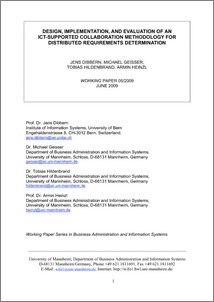|
Design, implementation, and evaluation of an ICT-supported collaboration methodology for distributed requirements determination
Dibbern, Jens
;
Geisser, Michael
;
Hildenbrand, Tobias
;
Heinzl, Armin
![[img]](https://madoc.bib.uni-mannheim.de/2370/1.hassmallThumbnailVersion/WP_05_2009_Requirements_Determination.pdf)  Vorschau |
|
PDF
WP_05_2009_Requirements_Determination.pdf
- Veröffentlichte Version
Download (1MB)
|
|
URL:
|
https://ub-madoc.bib.uni-mannheim.de/2370
|
|
URN:
|
urn:nbn:de:bsz:180-madoc-23706
|
|
Dokumenttyp:
|
Arbeitspapier
|
|
Erscheinungsjahr:
|
2009
|
|
Titel einer Zeitschrift oder einer Reihe:
|
None
|
|
Sprache der Veröffentlichung:
|
Englisch
|
|
Einrichtung:
|
Fakultät für Betriebswirtschaftslehre > Sonstige - Fakultät für Betriebswirtschaftslehre
|
|
MADOC-Schriftenreihe:
|
Area Information Systems and Institute for Enterprise Systems > Working Papers Lehrstuhl für ABWL und Wirtschaftsinformatik (Heinzl) (bis 2011)
|
|
Fachgebiet:
|
330 Wirtschaft
|
|
Normierte Schlagwörter (SWD):
|
Softwareentwicklung , Methode der partiellen kleinsten Quadrate , Wiki , Computerunterstützte Kommunikation
|
|
Freie Schlagwörter (Englisch):
|
Requirements engineering , computer-mediated communication , methodology , collaboration tool , experiment , design science , wiki , PLS
|
|
Abstract:
|
As information systems development becomes more distributed, information and communication technology (ICT) has become crucial to overcome distance and to enable collaboration between system users and analysts. This study presents the design, implementation, and experimental evaluation of a new technology-supported collaborative methodology for requirements determination. The new ICT-supported methodology enables the elicitation, analysis, specification, and validation of requirements in a distributed environment. Its design follows the theoretical principles of Te’eni’s (2001) cognitiveaffective model of organizational communication for IT design and combines established methods as well as techniques for requirements identification, formulation, dependency determination, prioritization, and selection in a coherent and innovative way. The resulting prototype is professionally implemented and evaluated in an experiment. The experiment is the first to compare the performance of traditional ways of communication via interviews and document exchange with that of communication via an Internet-based collaboration platform for requirements determination. The results show that, both, the efficiency of the overall requirements determination process as well as the overall quality of the resulting requirements, are higher when using the new collaborative methodology. In terms of quality, efficiency, the user and analyst perspectives need to be distinguished. While the effort for requirements elicitation increases for the analysts, this up-front investment pays off in terms of significantly lower effort for the later specification and validation of requirements. In contrast, the users benefit in particular from lower effort during requirements elicitation and analysis.
|
 | Das Dokument wird vom Publikationsserver der Universitätsbibliothek Mannheim bereitgestellt. |
 Suche Autoren in Suche Autoren in
Sie haben einen Fehler gefunden? Teilen Sie uns Ihren Korrekturwunsch bitte hier mit: E-Mail
Actions (login required)
 |
Eintrag anzeigen |
|



 Suche Autoren in
Suche Autoren in